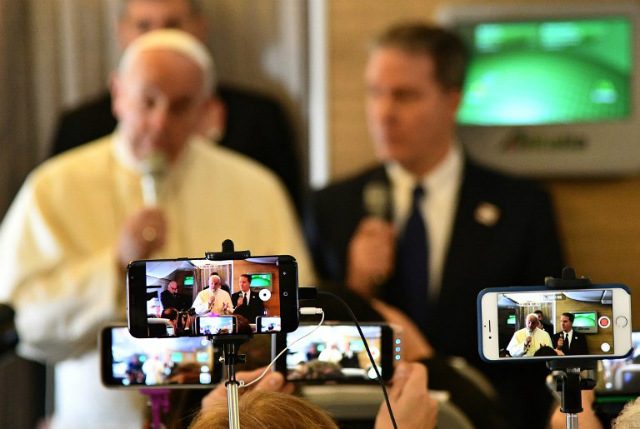SUMMARY
This is AI generated summarization, which may have errors. For context, always refer to the full article.

MANILA, Philippines – Describing them as “protectors of news,” Pope Francis reminded journalists that theirs is “not just a job” but “a mission” in an age of many falsehoods.
“If responsibility is the answer to the spread of fake news, then a weighty responsibility rests on the shoulders of those whose job is to provide information, namely, journalists, the protectors of news,” Pope Francis said in his message released on Wednesday, January 24, for World Communications Day.
Still referring to journalists, the Pope continued, “In today’s world, theirs is, in every sense, not just a job; it is a mission.”
The pontiff then pushed for journalism “that is truthful and opposed to all falsehoods, rhetorical slogans, and sensational headlines.”
This, he said, is “a journalism created by people for people, one that is at the service of all, especially those – and they are the majority in our world – who have no voice.”
The Pope’s World Communications Day message is the same document where he slammed fake news, calling it “a sign of intolerant and hypersensitive attitudes.”
The Pope’s message comes as fake news threatens democracies such as the Philippines, posing a challenge to journalists. (READ: Propaganda war: Weaponizing the internet)
Read part of the Pope’s message, specifically about journalists, in the excerpt below:
The best antidotes to falsehoods are not strategies, but people: people who are not greedy but ready to listen, people who make the effort to engage in sincere dialogue so that the truth can emerge; people who are attracted by goodness and take responsibility for how they use language.
If responsibility is the answer to the spread of fake news, then a weighty responsibility rests on the shoulders of those whose job is to provide information, namely, journalists, the protectors of news. In today’s world, theirs is, in every sense, not just a job; it is a mission. Amid feeding frenzies and the mad rush for a scoop, they must remember that the heart of information is not the speed with which it is reported or its audience impact, but persons.
Informing others means forming others; it means being in touch with people’s lives. That is why ensuring the accuracy of sources and protecting communication are real means of promoting goodness, generating trust, and opening the way to communion and peace.
I would like, then, to invite everyone to promote a journalism of peace. By that, I do not mean the saccharine kind of journalism that refuses to acknowledge the existence of serious problems or smacks of sentimentalism.
On the contrary, I mean a journalism that is truthful and opposed to falsehoods, rhetorical slogans, and sensational headlines. A journalism created by people for people, one that is at the service of all, especially those – and they are the majority in our world – who have no voice. A journalism less concentrated on breaking news than on exploring the underlying causes of conflicts, in order to promote deeper understanding and contribute to their resolution by setting in place virtuous processes. A journalism committed to pointing out alternatives to the escalation of shouting matches and verbal violence.
To this end, drawing inspiration from a Franciscan prayer, we might turn to the Truth in person:
Lord, make us instruments of your peace.
Help us to recognize the evil latent in a communication that does not build communion.
Help us to remove the venom from our judgments.
Help us to speak about others as our brothers and sisters.
You are faithful and trustworthy; may our words be seeds of goodness for the world:
where there is shouting, let us practice listening;
where there is confusion, let us inspire harmony;
where there is ambiguity, let us bring clarity;
where there is exclusion, let us offer solidarity;
where there is sensationalism, let us use sobriety;
where there is superficiality, let us raise real questions;
where there is prejudice, let us awaken trust;
where there is hostility, let us bring respect;
where there is falsehood, let us bring truth.
Amen.
– Rappler.com
Add a comment
How does this make you feel?
There are no comments yet. Add your comment to start the conversation.